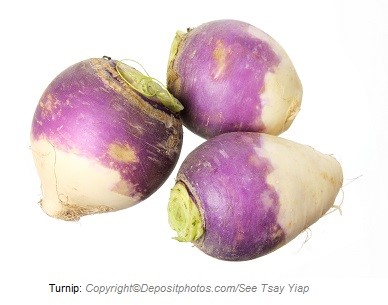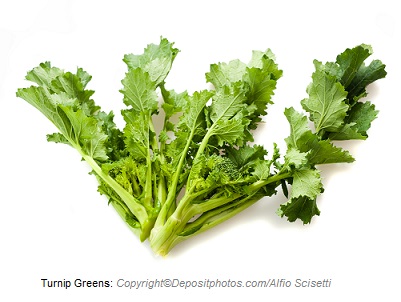Turnip is a root vegetable from Brassica family and turnip leaves are called  “turnip greens”. Turnip is botanically related to kale and broccoli. One cup of sliced turnip contains 8 grams of carbohydrates, 2 grams of fiber and 1 gram of protein. One cup of chopped turnip greens contains 4 grams of carbohydrates, 2 grams of fiber and 1 gram of protein.
“turnip greens”. Turnip is botanically related to kale and broccoli. One cup of sliced turnip contains 8 grams of carbohydrates, 2 grams of fiber and 1 gram of protein. One cup of chopped turnip greens contains 4 grams of carbohydrates, 2 grams of fiber and 1 gram of protein.
Average calories: 36 per one cup of sliced turnip, and 20 per one cup of chopped turnip greens.
|
Turnip: one cup, sliced |
|
|
Carbohydrate |
8 |
|
Fiber |
2 |
|
Protein |
1 |
|
Fat |
0 |
|
Calories |
36 |
|
Turnip greens: one cup, chopped |
|
|
Carbohydrate |
4 |
|
Fiber |
2 |
|
Protein |
1 |
|
Fat |
0 |
|
Calories |
20 |
Vitamins found in higher amounts: vitamins C, B6, and B9 in turnip, and vitamins A, K, C and B9 in turnip greens.
Minerals found in higher amounts: potassium, manganese, magnesium and calcium in turnip, and manganese, copper, calcium and potassium in turnip greens.
Phytonutrients found in higher amounts and their health benefits: the phytochemicals in turnip and turnip greens are phytosterols, carotenoids, sulforaphane, glucosinolates and isothiocyanates.
Phytosterols are plant sterols that can help lower bad cholesterol and improve cardiovascular health. One cup of turnip and turnip greens has 9.2 mg and 6.6 mg of phytosterols, respectively. The most abundant phytosterol in turnip is campesterol.
Turnip greens contain carotenoids (beta-carotene, lutein, zeaxanthin, and lycopene). They are powerful antioxidants essential for healthy eyes and prostate gland.
Compared to other vegetables from Brassica family (broccoli, cauliflower, kale and cabbage), turnip greens have more the phytonutrients glucosinolates and isothiocyanates. Isothiocyanates induce apoptosis (programmed cell death) in certain cancers and can enhance liver detoxification by stimulating both phase I and phase II of detoxifying processes.However, the downside of isothiocyanides is that they interfere with uptake of iodine, leading to goiter (enlargement of thyroid gland).
The two important glucosinolates identified in turnip greens in substantial amounts are gluconasturtiian and glucotropaeolin. They can convert into isothiocyanates.
Sulforaphane can inhibit the growth of Helicobacter Pylori, a microbe responsible for peptic ulcer and stomach upset. It has an anti-cancer activity against estrogen-related cancers. Sulforaphane is also found in Bok Choy, Brussels sprouts, cabbage, broccoli, cauliflower, kale, collards, kohlrabi, mustard, radish,arugula, and watercress.

